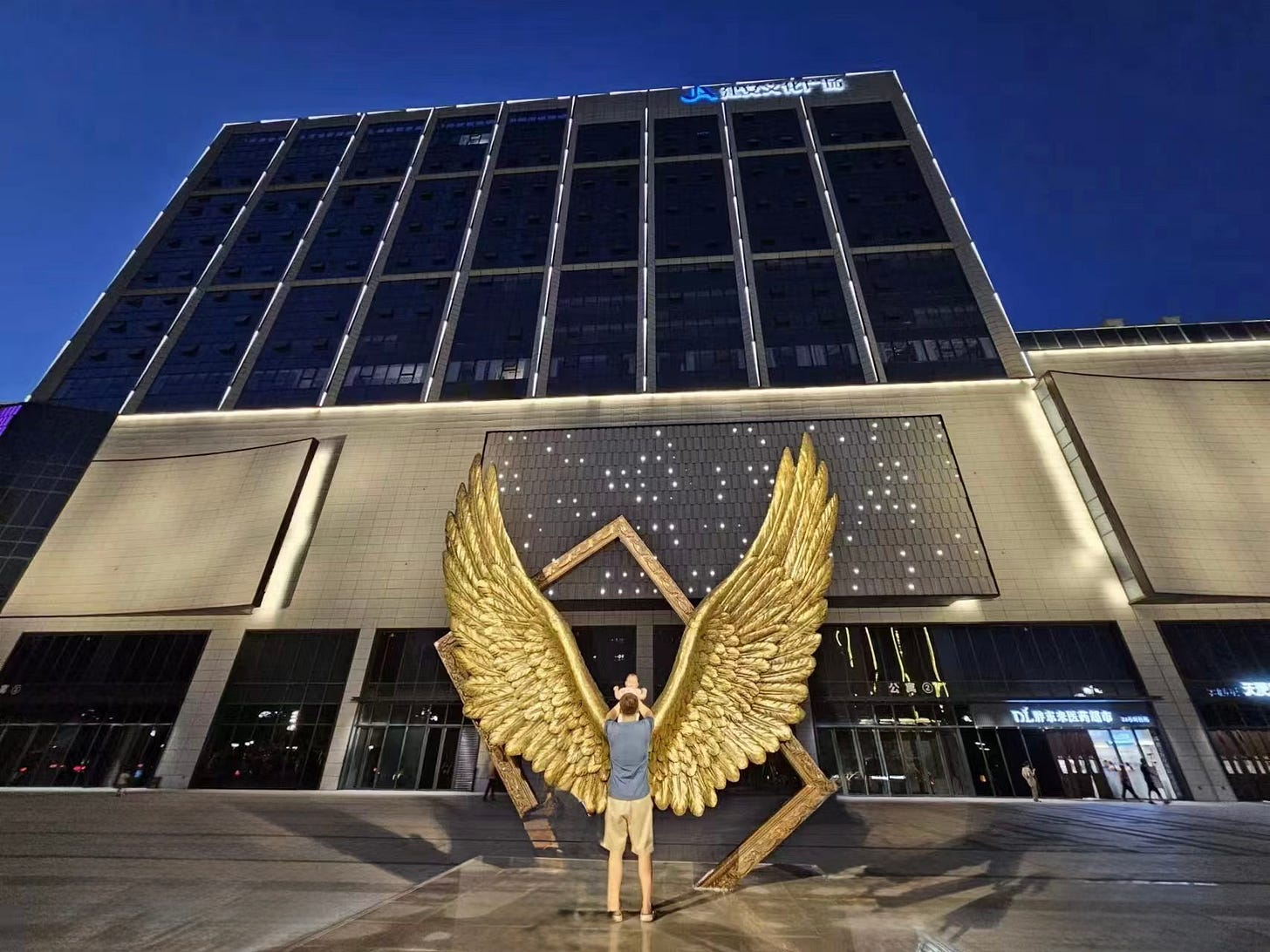Is Pangdonglai-ism the answer to China’s ailing supermarkets?
A six-hour drive for orange juice, and a glimpse of Chinese retail’s future
It was a bright summer Friday in 2023 when a Taiwanese friend came to visit me in Xi’an. At the end of the day, with nothing left on our agenda, I made a spontaneous suggestion: why not head next door to the neighbor Henan Province for a little shopping?
More specifically, to visit Pangdonglai (胖东来, literally “Chubby Donglai,” with Donglai being the founder’s given name), the viral supermarket that had overtaken Douyin and Xiaohongshu with something close to messianic fervor.
I had gone shopping across provincial or national borders once before, back in 2012. It was somewhere in the Netherlands, near the western edge of the German border, though I could not identify the precise location now. What I do remember vividly is seeing a €500 banknote for the first time, handed across the counter of a Gucci or Chanel store.
And this time, a decade later, we drove six hours to a local supermarket in Xuchang, a lower-tier city in central Henan and better known as the capital of Cao Cao’s Wei empire during the Three Kingdoms era.
Unlike that first cross-border trip, I do not think I will forget a single detail ten years from now.
The first surprise came the moment I stepped inside: the entrance lobby. I had never seen a Chinese supermarket styled with such deliberate calm, such Apple Store-like reverence. It was clean. It was bright. It felt almost sacred. Imagine walking through the usual chaos of a city plaza dodging electric scooters and street vendors and then stepping into a space with no promotions, no clashing advertisements, not even background music. What greets you instead is an unexpected sense of serenity.
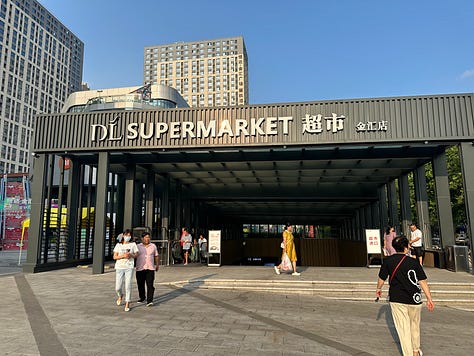
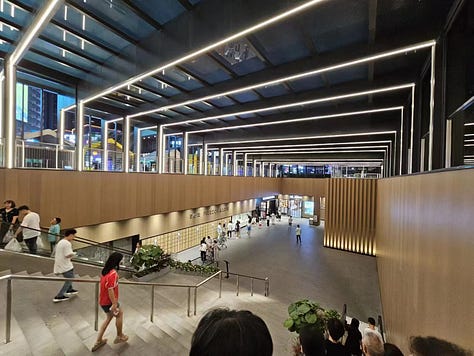

Only later did I learn that Pangdonglai has a strict policy: no promotional booths at the entrance. Most supermarkets in China place the exit far from the entrance and line the path with vendors hawking everything from credit cards to shampoo. It is common. It is smart business. But who goes to a supermarket expecting something like spiritual clarity? And yet, standing in that atrium, I realized maybe that was exactly what I had come for.
The interior is not lavish, but it feels unmistakably high-end. The floor tiles are immaculately laid, with no black grout lines like those in most malls or markets, just subtle filler that matches the pattern. Perhaps the most charming detail of all: at the entrance, Pangdonglai posts the sourcing information for every material used in the store, including tiles, lighting, and refrigeration units, complete with brand names and contact numbers.
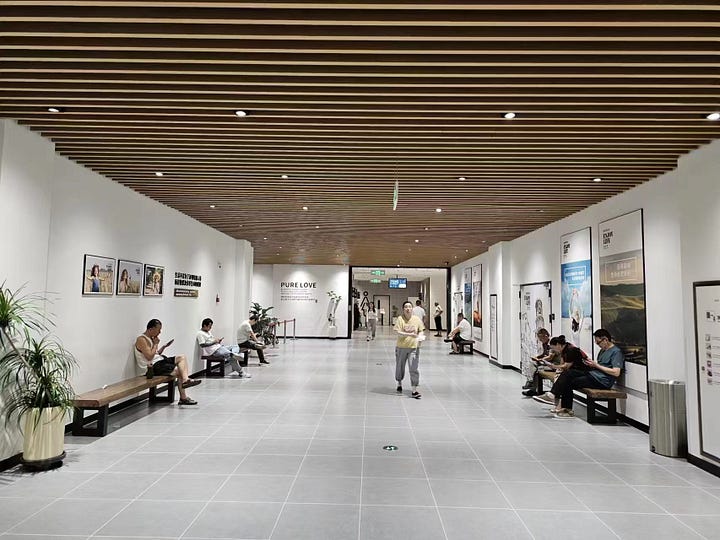

As far as I know, it is the only supermarket in the world where the hardware gets its own credits.
But what impressed me most, more than decorations or the tiles, were the people. The Jinhui branch we visited is the smallest of Pangdonglai’s stores in Xuchang. It was busy, but not overwhelming, and there was enough parking space that made the experience feel local.
What struck me at Jinhui was that every employee I encountered looked genuinely happy. It was not the forced cheer you often see from highway tollbooth attendants, but something more relaxed, more sincere, as if they actually liked being there.

One small but telling detail: all the cashiers were seated. This might be standard in many countries, but in China it is still rare. Even at high-end chains, checkout clerks are expected to stand for their entire shift. At Pangdonglai, the simple act of letting staff sit felt quietly humane.
And the difference did not stop there. I noticed that employees moved with ease, without the mechanical tension that often accompanies low-wage service work. I saw a security guard helping an elderly customer with her groceries. When another customer’s electric scooter got stuck in the lot outside the supermarket, he stepped in to assist, even though the parking area technically was not part of the store.
At Pangdonglai’s flagship location, Angel City, I had another unexpected encounter. In the TV section, I asked a young saleswoman whether they had LG models. She told me they did not. I then asked about Samsung. Before launching into the usual skit about features and specifications, she paused and said, quite plainly, “But Samsung TVs do not support Dolby Vision.”
That single sentence broke every rule of conventional Chinese retail logic. She began with a limitation, not a selling point. What surprised me even more was that she seemed to say it because I had asked about LG first. She knew the difference, even though LG was not sold in the store at all.
There were so many other small details, so many quiet interactions, that stayed with me. By the time we left Xuchang, the trunk was filled with Pangdonglai orange juice and premade fruit cereal, and we carried something else too: a lingering sense of wonder.
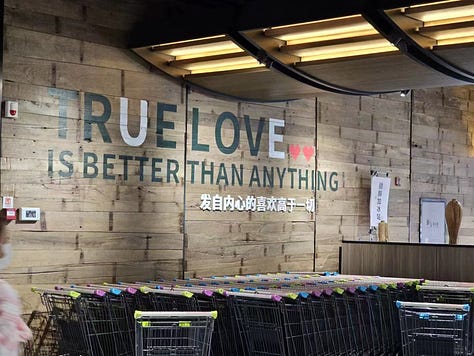


In 2024, a wave of food safety scandals swept across China. Almost overnight, Pangdonglai became a national symbol of trust. Demand surged. Their online store began selling out within minutes of each restock, and an informal gray market of resellers sprang up. What had once been a beloved local supermarket was now something else entirely: a pilgrimage site, a hotspot for speculators hoarding Pangdonglai-branded goods, a destination where out-of-towners lined up just to say they had been.
From what I have seen in recent videos, crowd control is now a daily necessity at many of their stores. The experience I had in 2023 may no longer be possible.
At the same time, supermarkets across China began taking notes. Many started copying Pangdonglai, or at least trying to. Among them was Yonghui Superstores, one of China’s largest grocery chains and a company several times Pangdonglai’s size.
When Yonghui, sometimes called the Chinese Walmart, announced in 2024 that it would undertake a Pangdonglai-style transformation, the move was both a declaration of ambition and a quiet admission of crisis.
Yonghui’s 2024 financials made the stakes clear. Total revenue fell 14.07 percent year-on-year to 67.574 billion yuan (about 9.31 billion USD), while net losses widened to 1.465 billion yuan (around 201.7 million USD).
As of June 2025, Yonghui has completed the revamp of 100 stores. Each of its 28 national regions has now delivered at least one remodeled store on its own.
The company plans to accelerate. By the end of July, it aims to have 150 upgraded stores. By September, 200. Before the Spring Festival in 2026, more than 300. The ultimate goal is to complete the overhaul of all 600+ stores by June 2026.
That transformation is happening at every level. In parallel with the store revamps, Yonghui is developing over 60 private-label products this year alone, with more to come in 2025 focused on quality, clean ingredients, and regional character.
Yonghui is also experimenting with profit-sharing for frontline staff. In the first quarter of 2025, 41 transformed stores distributed over 26 million yuan in bonuses and dividends to employees. The company has launched an internal “Craftsman Plan” to train 10,000 skilled workers and aims to offer top-performing store managers some of the best compensation in the industry.
Despite real financial pain, the company argues that much of it is temporary. Clearance discounts on legacy inventory, shutdown costs for hundreds of old stores, and upfront investments in new systems and people are short-term hits.
Still, insiders say profitability is already returning. Of the transformed stores that have been open for three months, most are back in the black. Sales have, in many cases, doubled. During the recent Dragon Boat Festival holiday, sales at over 80 stores grew 87 percent year-on-year.
“Do not rush,” Pangdonglai’s founder Yu Donglai reportedly told Yonghui leadership. “Take two or three years to get healthy again.” If the trajectory holds, Yonghui may just do that, and emerge on the other side not only leaner, but more human.
Near where I live, there is an RT-Mart. The supermarket brand originated in Taiwan, and Sun Art Retail runs the chain in mainland China. Formerly under Alibaba’s retail arm, it was sold to DCP Capital in early 2025. It is also beginning to absorb Pangdonglai’s influence, at least in part.
From my observation, changes became visible in recent months. Free water dispensers were installed, shelf heights adjusted for easier access, displays looked more intentional, and customer interaction zones began to appear. The mood was changing.
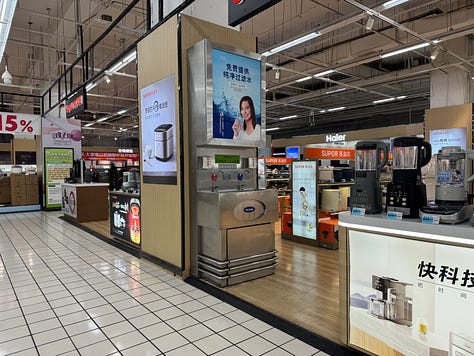

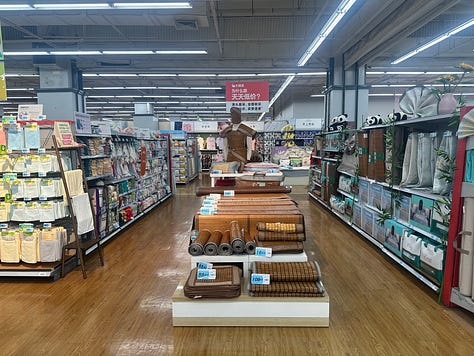
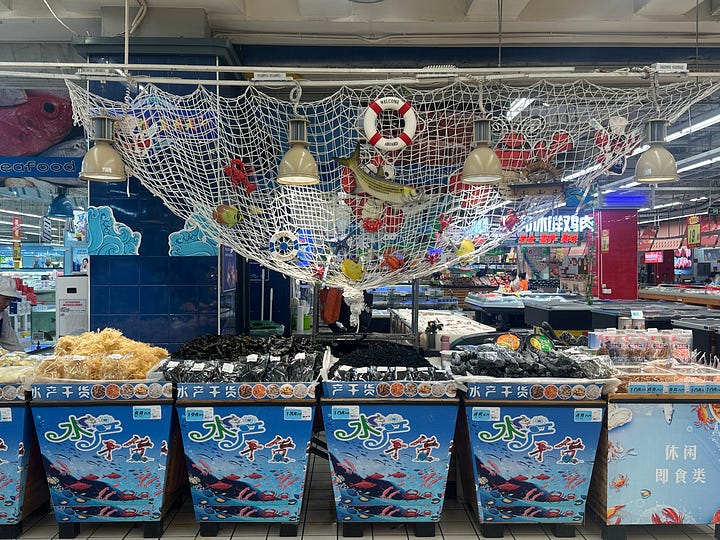

On February 27, 2025, Alibaba officially sold Sun Art Retail Group to DCP Capital. Just weeks later, Sun Art Retail CEO Shen Hui visited Pangdonglai, toured its central kitchen and employee quarters, and joined in discussions on the future of retail. Initial plans suggest that RT-Mart will pilot Pangdonglai-style revamp in select stores across Shanghai, Guangdong, and Jiangsu Provinces.
By September 2024, RT-Mart operated 502 stores nationwide, including six membership-format outlets. Its mid-year financials showed a 2.96 percent decline in revenue to 34.7 billion yuan, but a sharp profit rebound to 206 million yuan, up over 150 percent year-on-year.
Shen Hui has stated that RT-Mart’s future depends not only on reducing costs but on rebuilding consumer trust through value, service, and consistency. The company plans to increase its share of private-label goods, especially in its membership stores, and is restructuring its supply chain to focus on freshness and tighter vendor relationships.
China’s supermarket sector continues to face fierce competition and internal pressure. Membership retails such as Walmart’s Sam’s Club and Costco are expanding rapidly, using bulk pricing and limited-time products to build loyal followings. Yet it is Pangdonglai, with just 13 stores in the cities of Xuchang and Xinxiang, that may be offering the most compelling blueprint for what comes next.
In 2024 alone, those 13 locations generated nearly 17 billion yuan ($2.34 billion) in sales and more than 800 million yuan ($110.2 million) in profit. The average monthly income for employees exceeded 9,000 yuan ($1,240), which is more than three times the local average in Xuchang.
For an industry long plagued by burnout, price wars, and razor-thin margins, these numbers feel almost mythical. Pangdonglai has also made it clear that it does not intend to scale quickly. In its 30th year, the company announced plans to enter only its third city: Zhengzhou, the capital of Henan Province.
The Panglonglai-ism is deceptively simple. Serve customers well. Treat employees with dignity. Offer a few unforgettable products. Whether China’s supermarkets can evolve into something uniquely reflective of the country’s values remains an open question.
But if they do, it will require more than redesigned floor plans or a handful of viral items. It will mean a transformation in how we think about the everyday economy, about human-centered business, and about the role of labor in modern life. The consequences may prove far more profound than they appear now. I will be watching.






